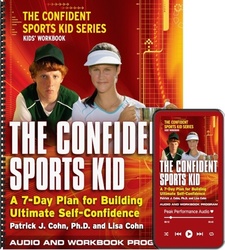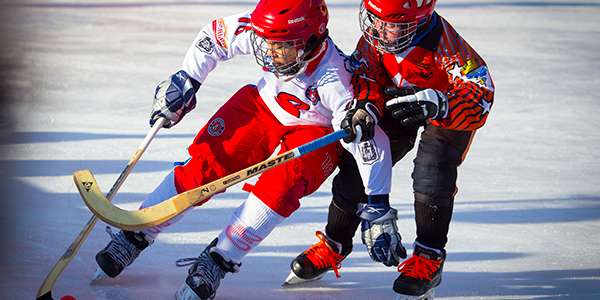Two Mental Skills Important for Success
Summary: Building trust and confidence is essential for young athletes to perform at their best. When athletes trust their skills, they rely on practice and muscle memory, allowing them to stay focused and decisive under pressure. Confidence grows as athletes prepare, improve, and recognize their successes.
Trust and confidence are very important for young athletes’ success in sports and are interrelated.
If athletes lack confidence, they don’t believe in their ability to perform under pressure. If they don’t trust their skills, they lack confidence heading into competitions.
Let’s take a look at confidence and trust, both mental game skills.
When your athletes feel confident, they believe they have the physical and mental traits needed to perform a skill. They believe they can develop skills through training and practice. And they have faith in their ability to perform a skill in competition, in spite of the pressure.
When athletes trust in their abilities, they know they have practiced enough–doing physical repetitions, for example–to just go for it and rely on muscle memory when they’re playing. Trust allows kids to simplify their game during competition. When they trust in themselves, they can be decisive and play athletically. They stay in the moment and don’t think about the outcome.
Confidence and trust influence each other. Kids build trust through repetition and practice. They build confidence by being prepared and recognizing their successes, improvements and positive qualities.
When athletes lack trust or confidence, they under-perform and are hesitant during competition.
Ben Simmons Has Confidence and Trust in His Shot
Here’s an example: Point guard Ben Simmons, a four-year veteran of the Philadelphia 76ers, is known for his aggressive defense and passing, but he’s also known for being hesitant about taking outside jump shots, especially from the three-point range.
In his first three seasons, Simmons only attempted three shots from the three-point line, going 1-for-3. In the first few games of the 2020-21 season, Simmons has attempted two three-pointers and made both.
Why has he improved? Simmons has been practicing and working on his three-point shot before games and in practices, developing both confidence and trust in his shot. It is clear that Simmons’ work has paid off.
Simmons described one of his three-pointers this season against the Orlando Magic. Simmons just released the ball with no conscious thought or worry about the outcome, he said.
“I came down [ the court]… Joel (Embiid) threw to me in the corner, and I let that go. Joel threw the pass, he knew I was gonna put it up. It was a shot that I work on, corner threes. I feel comfortable taking it so I knocked it down.”
Teammate Seth Curry said he’s confident in Simmons’ ability to make three-pointers.
“I’ve seen him make it in practice, and I know he can knock it down. Especially from the corner, so it’s just a matter of him doing it in a game and stepping into it with confidence. It didn’t look like there was too much hesitation on the shot, and I expected it to go in, to be honest.”
When, like Simmons, young athletes work on their physical skills, without self-judgment or harsh criticism, they build the needed trust and confidence to perform at their peak under the pressure of competition.
Parents Can Help Sports Kids Develop Trust and Confidence
Parents can help kids build trust and confidence by encouraging them to practice, prepare, test their skills and repeat the process.
To help build trust and confidence, young athletes should visualize themselves performing skills successfully in competition. When they visualize, they imprint those images in their mind, which helps them during competition.
Sports kids should mentally rehearse playing freely and athletically during their warm-up routines. Then they should get into the mindset that practice is behind them; it’s time to just compete.
Improving trust and confidence is critical to performance and success in sports. Parents should help kids understand these benefits, and help their kids work on building these all-important skills.
Building Trust and Confidence
1.Build Trust Through Repetition
Encourage your athlete to practice skills consistently. Repetition builds muscle memory, allowing your child to trust their ability during competition.
2.Focus on Skill Development
Have your athlete work on improving weak areas without judgment. Seeing measurable improvement increases confidence and trust in their abilities.
3.Visualize Successful Performance
Teach your athlete to picture themselves executing skills successfully in competition. Visualization strengthens confidence and prepares the mind for pressure situations.
4.Mentally Rehearse Before Competition
Use warm-up routines to rehearse playing freely and confidently. Mental rehearsal helps your athlete stay in the moment and trust their preparation.
5.Encourage Decisive Play
Support your athlete in making quick, confident decisions during games. Trust in their skills allows them to act without overthinking or hesitation.
6.Praise Effort and Progress
Acknowledge hard work, preparation, and small successes. Recognizing improvement reinforces confidence and builds trust in their abilities.
Related Sports Psychology Articles
*Subscribe to The Ultimate Sports Parent Podcast
*Subscribe to Peak Performance Sports on Youtube
Download a free sports psychology report to improve your mental game!
The Confident Sports Kid

When kids lack confidence, they doubt themselves, stop taking risks, play tentatively, and are hard on themselves. As a result, kids often lose their motivation to improve. Ultimately, these barriers keep them from enjoying sports and making the most of their physical talent.
“The Confident Sports Kid” program is actually two programs: one that teaches sports parents how to boost their kids’ confidence, and another that teaches young athletes age 8 to 18 how to improve their self talk, avoid negative thinking, overcome expectations that limit confidence, and much more. The program will help kids boost their confidence in sports and life…and enjoy sports more.
FAQ: Building Trust and Confidence in Young Athletes
Q: Why is trust important for young athletes?
A: Trust helps athletes rely on their skills and muscle memory, allowing them to stay focused and play decisively during competition.
Q: How does confidence affect performance?
A: Confidence gives athletes belief in their abilities, helping them handle pressure and perform at their best.
Q: How can parents help build trust and confidence?
A: Parents can encourage consistent practice, skill development, visualization, and mental rehearsal to reinforce trust and confidence.
Q: What role does practice play in developing confidence?
A: Repeated practice builds trust in skills and muscle memory, which strengthens confidence during competitions.
Q: How can visualization improve performance?
A: Visualizing successful execution of skills helps athletes imprint positive performance patterns in their mind for competitions.
Q: When should athletes focus on competing rather than practicing?
A: After preparation and warm-up, athletes should shift their mindset to compete freely, trusting their training and skills.
Kids Sports Psychology expert Patrick Cohn, Ph.D. has helped athletes for over 35 years to enhance their performance. Dr. Cohn earned a master’s degree in sports psychology from CSUF and a Ph.D. from the University of Virginia, specializing in Applied Sports Psychology. Today, he is the president and founder of Peak Performance Sports, LLC in Orlando, Florida.

